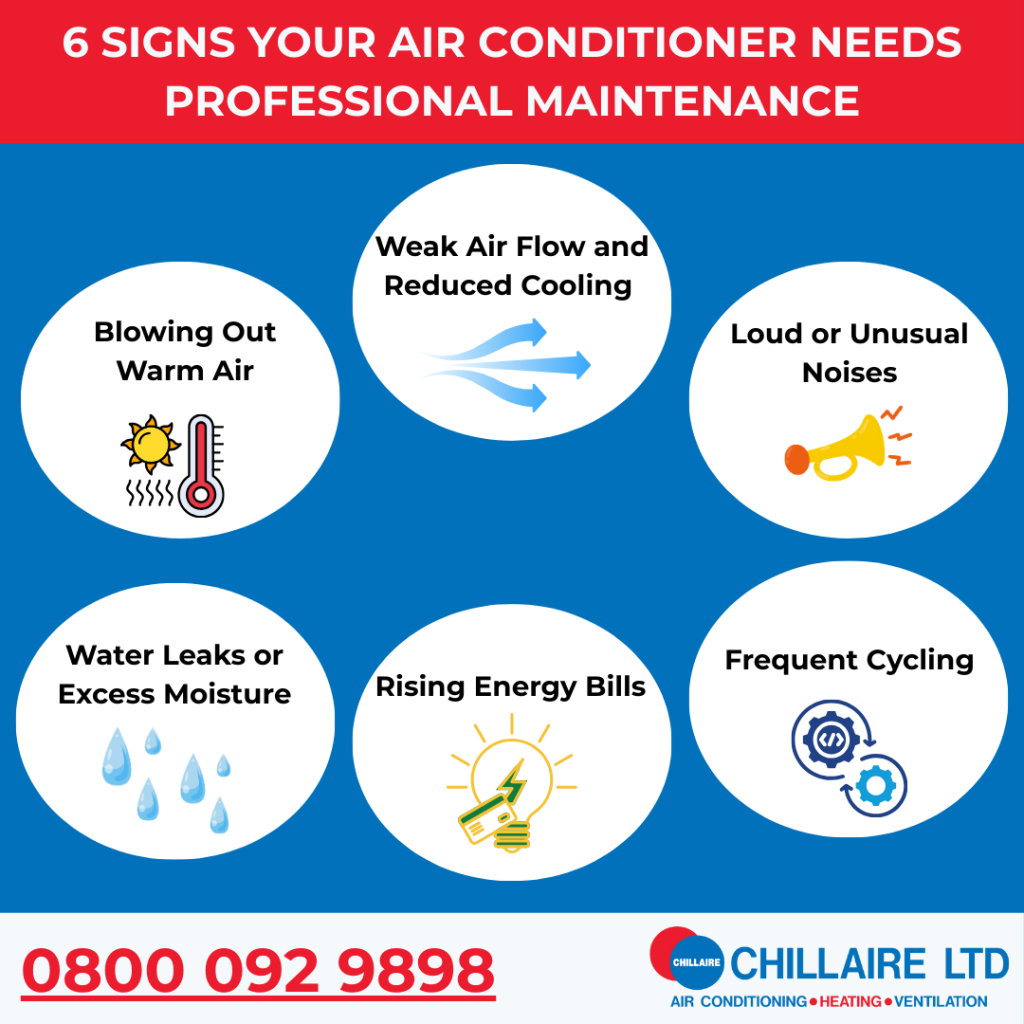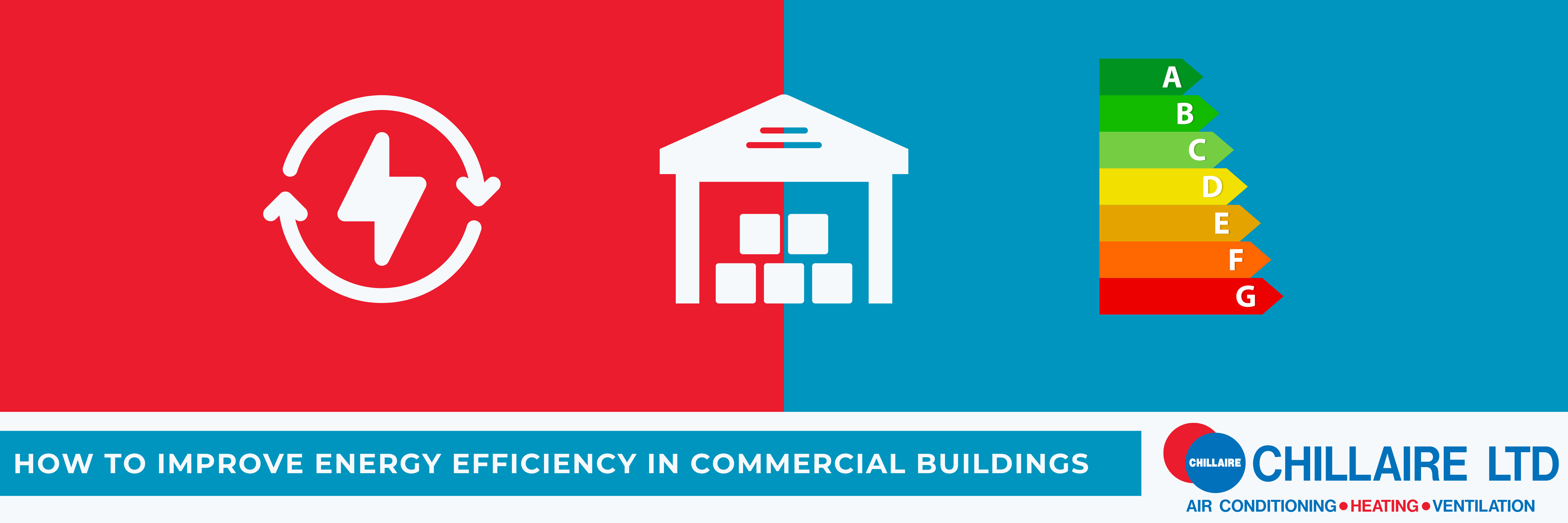 6 Signs Your Air Conditioner Needs Professional Maintenance
6 Signs Your Air Conditioner Needs Professional Maintenance
Air conditioning systems usually show small changes in performance long before a complete breakdown. Weak airflow, unusual noises, rising energy bills and excessive moisture are all signs that your system may need professional attention. In this article, we will go through 6 signs that your air conditioning system needs professional maintenance.

1. Weak Air Flow and Reduced Cooling
When your air conditioner is no longer pushing out a strong flow of cool air, it’s usually a sign that something inside the system isn’t working as it should. Weak airflow is often caused by blocked or dirty air filters, restricted heat exchanger or a failing component within the unit. Any of these can stop air moving freely through the system.
Proper air conditioner maintenance allows a technician to identify the exact cause of the problem and return your AC to full functionality.
Noticing weak airflow or poor cooling? Book your air conditioner maintenance today and let our engineers restore full performance before the problem gets worse.
2. Loud or Unusual Noises
An air conditioning system should run quietly, with little more than a gentle hum and the sound of air moving through the vents. If you start hearing loud or unusual noises such as whistling, grinding, rattling, banging or squealing, it’s a sign something is wrong with your air conditioner.
- Whistling noise often means that the filters are dirty and need cleaning or the heat exchanger is getting clogged up and requires cleaning, there may be trapped debris in the dampers or ducting.
- Rattling or banging often means there are loose or broken components, trapped debris or internal parts that have shifted out of place.
- Grinding noises usually point to a problem with the motor or bearings.
- Squealing can be a sign of a worn belt or a component struggling under strain.
Ignoring these sounds can mean much worse internal damage for your AC. Booking a professional maintenance check for your air conditioner can repair and prevent any further damage.
Hearing strange noises from your AC? Our air conditioner maintenance service can identify the fault early and prevent costly internal damage.
3. Frequent Cycling (Short On/Off Periods or Not Turning Off)
Your air conditioner should follow a consistent cooling cycle, turning on and off at regular intervals. However, if you start to notice cycling more frequently than usual, it could be a sign that your AC needs professional maintenance. Short cycling can be caused by thermostat issues, low refrigerant levels or electrical problems. When your AC cycles too often, it struggles to maintain the desired temperature, putting unnecessary stress on the components. This will start to increase your energy consumption and shorten the lifespan of your AC.
If you notice your AC short cycling, it’s best to book your air conditioning system maintenance as soon as possible.
Short cycling is a sign your system needs attention. Book your air conditioning system maintenance check with Chillaire to protect your equipment and improve efficiency.
If your air conditioner’s filters or heat exchangers become clogged, the system cannot deliver its full cooling or heating capacity. As a result, the air conditioner continues to run because it senses that the room has not yet reached the temperature set on the thermostat.
However, with restricted airflow and reduced efficiency, the unit may only be operating at around 50% of its potential output. This causes it to work much harder for longer periods, increasing your energy bills, accelerating wear and tear, raising maintenance costs, and ultimately shortening the overall lifespan of your air conditioning system.
4. Rising Energy Bills With No Explanation
If you have noticed that your energy bill just keeps increasing, despite no change to your usage, then it could actually be a sign that there is an issue with your AC. A defective or unclean inefficient system will require more power to cool your building, which will cause higher electricity costs.
Worn components, dirty air filters and refrigerant leaks all force the system to overcompensate and use more energy than necessary. Regular air conditioner maintenance helps keep energy consumption under control by making sure every part of the system is operating as it should.
If your energy bills are climbing, we can carry out professional air conditioner maintenance to restore efficiency and reduce unnecessary running costs.
5. Your AC is Blowing Out Warm Air Instead
If your air conditioner is blowing warm air, it’s a clear sign that something is wrong with your AC system. Several issues can cause this, including a failing compressor or thermostat. If your thermostat is set correctly but the unit still produces warm air, there may be a problem with the cooling cycle. Low refrigerant levels can stop the system from absorbing and removing heat effectively, while a damaged compressor will struggle to circulate the refrigerant needed for proper cooling.
A professional AC technician can find and fix these issues before they lead to further damage.
Blowing warm air is a sign something isn’t right. Book your air conditioning maintenance check today, so we can quickly diagnose the issue and get your AC working properly again.
6. Water Leaks or Excess Moisture
Your air conditioner system naturally removes moisture from the air as it cools. However, another sign your AC requires professional maintenance is if you notice water pooling around the unit or excessive condensation.
This could be down to a broken condensate pump or even a refrigerant leak leading to icing up of the heat exchanger. It’s important not to leave this unchecked, as excessive moisture can eventually lead to mould growth and water damage, which will ultimately damage your AC system. Mould growth is especially concerning because it can be circulated through the system and affect indoor air quality.
A properly functioning AC unit should be draining moisture efficiently, so any signs of leakage should not be ignored. With regular air conditioning system maintenance, any water-related issue can be addressed so your AC can continue to run safely.
Noticing water around your unit or excess moisture? Contact us today, and our professional engineers can resolve drainage and moisture issues.
Professional Air Conditioner Maintenance at Chillaire
At Chillaire, we have been delivering professional air conditioner maintenance across the Midlands for almost 30 years. We work with commercial and industrial air conditioning systems.
Our qualified engineers cover planned air conditioning system maintenance and servicing to help keep your equipment running efficiently. Every service is completed by professionals who understand current UK F-Gas regulations and safety requirements.
Book your professional air conditioner maintenance with Chillaire to ensure your AC system cools and performs at its best for years to come.
For advice on recognising when it’s time to replace your air conditioner system instead of just servicing it, see article on when you need an air conditioner replacement.











